“Look here, Burger,” said Kennedy, “I do wish that you would confide in me.”
The two famous students of Roman remains sat together in Kennedy’s comfortable room overlooking the Corso. The night was cold, and they had both pulled up their chairs to the unsatisfactory Italian stove which threw out a zone of stuffiness rather than of warmth. Outside under the bright winter stars lay the modern Rome, the long, double chain of the electric lamps, the brilliantly lighted cafes, the rushing carriages, and the dense throng upon the footpaths. But inside, in the sumptuous chamber of the rich young English archaeologist, there was only old Rome to be seen. Cracked and timeworn friezes hung upon the walls, grey old busts of senators and soldiers with their fighting heads and their hard, cruel faces peered out from the corners. On the centre table, amidst a litter of inscriptions, fragments, and ornaments, there stood the famous reconstruction by Kennedy of the Baths of Caracalla, which excited such interest and admiration when it was exhibited in Berlin. Amphorae hung from the ceiling, and a litter of curiosities strewed the rich red Turkey carpet. And of them all there was not one which was not of the most unimpeachable authenticity, and of the utmost rarity and value; for Kennedy, though little more than thirty, had a European reputation in this particular branch of research, and was, moreover, provided with that long purse which either proves to be a fatal handicap to the student’s energies, or, if his mind is still true to its purpose, gives him an enormous advantage in the race for fame. Kennedy had often been seduced by whim and pleasure from his studies, but his mind was an incisive one, capable of long and concentrated efforts which ended in sharp reactions of sensuous languor. His handsome face, with its high, white forehead, its aggressive nose, and its somewhat loose and sensual mouth, was a fair index of the compromise between strength and weakness in his nature.
Of a very different type was his companion, Julius Burger. He came of a curious blend, a German father and an Italian mother, with the robust qualities of the North mingling strangely with the softer graces of the South. Blue Teutonic eyes lightened his sun-browned face, and above them rose a square, massive forehead, with a fringe of close yellow curls lying round it. His strong, firm jaw was clean-shaven, and his companion had frequently remarked how much it suggested those old Roman busts which peered out from the shadows in the corners of his chamber. Under its bluff German strength there lay always a suggestion of Italian subtlety, but the smile was so honest, and the eyes so frank, that one understood that this was only an indication of his ancestry, with no actual bearing upon his character. In age and in reputation, he was on the same level as his English companion, but his life and his work had both been far more arduous. Twelve years before, he had come as a poor student to Rome, and had lived ever since upon some small endowment for research which had been awarded to him by the University of Bonn. Painfully, slowly, and doggedly, with extraordinary tenacity and single-mindedness, he had climbed from rung to rung of the ladder of fame, until now he was a member of the Berlin Academy, and there was every reason to believe that he would shortly be promoted to the Chair of the greatest of German Universities. But the singleness of purpose which had brought him to the same high level as the rich and brilliant Englishman, had caused him in everything outside their work to stand infinitely below him. He had never found a pause in his studies in which to cultivate the social graces. It was only when he spoke of his own subject that his face was filled with life and soul. At other times he was silent and embarrassed, too conscious of his own limitations in larger subjects, and impatient of that small talk which is the conventional refuge of those who have no thoughts to express.
And yet for some years there had been an acquaintanceship which appeared to be slowly ripening into a friendship between these two very different rivals. The base and origin of this lay in the fact that in their own studies each was the only one of the younger men who had knowledge and enthusiasm enough to properly appreciate the other. Their common interests and pursuits had brought them together, and each had been attracted by the other’s knowledge. And then gradually something had been added to this. Kennedy had been amused by the frankness and simplicity of his rival, while Burger in turn had been fascinated by the brilliancy and vivacity which had made Kennedy such a favourite in Roman society. I say “had,” because just at the moment the young Englishman was somewhat under a cloud. A love-affair, the details of which had never quite come out, had indicated a heartlessness and callousness upon his part which shocked many of his friends. But in the bachelor circles of students and artists in which he preferred to move there is no very rigid code of honour in such matters, and though a head might be shaken or a pair of shoulders shrugged over the flight of two and the return of one, the general sentiment was probably one of curiosity and perhaps of envy rather than of reprobation.
“Look here, Burger,” said Kennedy, looking hard at the placid face of his companion, “I do wish that you would confide in me.”
As he spoke he waved his hand in the direction of a rug which lay upon the floor. On the rug stood a long, shallow fruit-basket of the light wicker-work which is used in the Campagna, and this was heaped with a litter of objects, inscribed tiles, broken inscriptions, cracked mosaics, torn papyri, rusty metal ornaments, which to the uninitiated might have seemed to have come straight from a dustman’s bin, but which a specialist would have speedily recognized as unique of their kind. The pile of odds and ends in the flat wicker-work basket supplied exactly one of those missing links of social development which are of such interest to the student. It was the German who had brought them in, and the Englishman’s eyes were hungry as he looked at them.
“I won’t interfere with your treasure-trove, but I should very much like to hear about it,” he continued, while Burger very deliberately lit a cigar. “It is evidently a discovery of the first importance. These inscriptions will make a sensation throughout Europe.”
“For every one here there are a million there!” said the German. “There are so many that a dozen savants might spend a lifetime over them, and build up a reputation as solid as the Castle of St. Angelo.”
Kennedy sat thinking with his fine forehead wrinkled and his fingers playing with his long, fair moustache.
“You have given yourself away, Burger!” said he at last. “Your words can only apply to one thing. You have discovered a new catacomb.”
“I had no doubt that you had already come to that conclusion from an examination of these objects.”
“Well, they certainly appeared to indicate it, but your last remarks make it certain. There is no place except a catacomb which could contain so vast a store of relics as you describe.”
“Quite so. There is no mystery about that. I HAVE discovered a new catacomb.”
“Where?”
“Ah, that is my secret, my dear Kennedy. Suffice it that it is so situated that there is not one chance in a million of anyone else coming upon it. Its date is different from that of any known catacomb, and it has been reserved for the burial of the highest Christians, so that the remains and the relics are quite different from anything which has ever been seen before. If I was not aware of your knowledge and of your energy, my friend, I would not hesitate, under the pledge of secrecy, to tell you everything about it. But as it is I think that I must certainly prepare my own report of the matter before I expose myself to such formidable competition.”
Kennedy loved his subject with a love which was almost a mania—a love which held him true to it, amidst all the distractions which come to a wealthy and dissipated young man. He had ambition, but his ambition was secondary to his mere abstract joy and interest in everything which concerned the old life and history of the city. He yearned to see this new underworld which his companion had discovered.
“Look here, Burger,” said he, earnestly, “I assure you that you can trust me most implicitly in the matter. Nothing would induce me to put pen to paper about anything which I see until I have your express permission. I quite understand your feeling and I think it is most natural, but you have really nothing whatever to fear from me. On the other hand, if you don’t tell me I shall make a systematic search, and I shall most certainly discover it. In that case, of course, I should make what use I liked of it, since I should be under no obligation to you.”
Burger smiled thoughtfully over his cigar.
“I have noticed, friend Kennedy,” said he, “that when I want information over any point you are not always so ready to supply it.”
“When did you ever ask me anything that I did not tell you? You remember, for example, my giving you the material for your paper about the temple of the Vestals.”
“Ah, well, that was not a matter of much importance. If I were to question you upon some intimate thing would you give me an answer, I wonder! This new catacomb is a very intimate thing to me, and I should certainly expect some sign of confidence in return.”
“What you are driving at I cannot imagine,” said the Englishman, “but if you mean that you will answer my question about the catacomb if I answer any question which you may put to me I can assure you that I will certainly do so.”
“Well, then,” said Burger, leaning luxuriously back in his settee, and puffing a blue tree of cigar-smoke into the air, “tell me all about your relations with Miss Mary Saunderson.”



